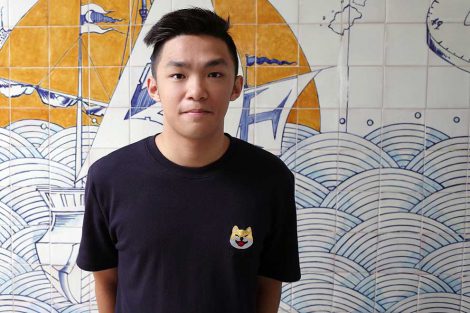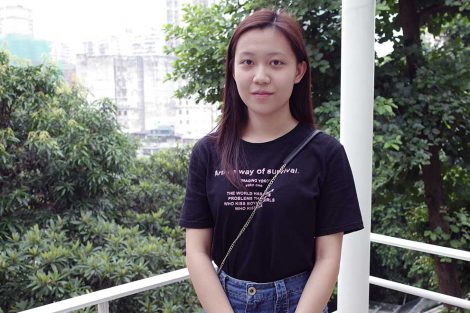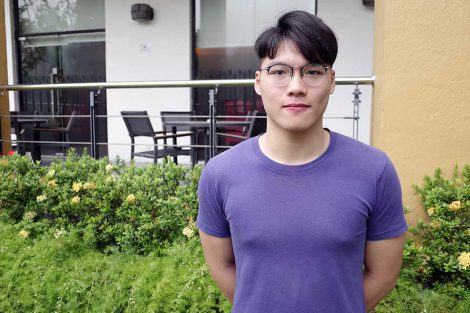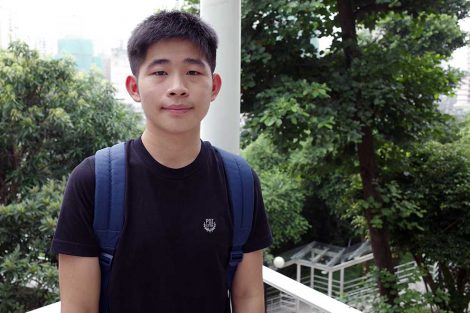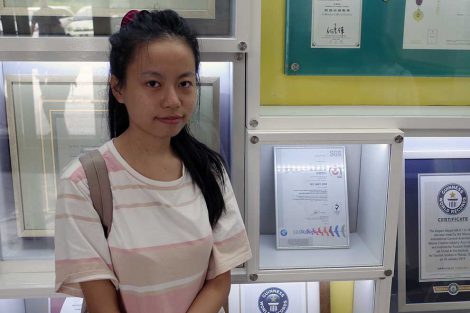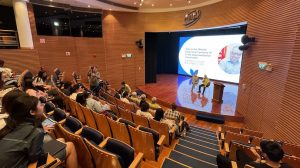IFT is welcoming this month a new intake of students. A total of 512 undergraduates – coming from Macao, Hong Kong, Mainland China, Malaysia and further afield – are putting on their IFT uniforms for the first time, preparing for 4 years of intense study, or for a 6-month exchange programme at the Institute.
As a leading institution in the field of tourism and hospitality education in the Asia-Pacific region, IFT each year attracts top-scoring high school graduates from Macao and beyond, all vying for a place at the Institute. Competition for enrolment for academic year 2018/19 has been as intense as usual, with some of the most talented students in Greater China and beyond seeking to study at IFT.
Year 1 student Edward Leong fits this profile. He achieved one of the highest scores in this year’s edition of the Joint Admission Examination (JAE) for Macao Four Higher Education Institutions, which potentially offers access to IFT, the University of Macao, the Macao Polytechnic Institute and the Macau University of Science and Technology.
Upon completing his secondary school studies in the English-language section of Yuet Wah College, Edward chose to enrol on the IFT programme leading to a bachelor degree in Hotel Management.
“I always like to take on new challenges and acquire knowledge in various areas,” he says. “Compared with other higher education institutions in Macao, IFT has the most diversified curriculum, which can equip me with a wide array of knowledge in the next 4 years.”
Edward expects the Hotel Management programme will provide him with the tools to craft a successful career in tourism and hospitality; one not only limited to Macao but also with an international scope.
Fanny Lam will be one of Edward’s fellow students, having also enrolled in the Hotel Management programme. She was attracted to IFT because of the Institute’s quality education.
“If you want to study in Macao about the service industry, there’s no place like IFT,” she says.
Fanny graduated from the English-language section of a local secondary school, Colégio de Santa Rosa de Lima. She was admitted to IFT via a special scheme. It enables high school principals directly to refer to the Institute individual students judged to have outstanding academic performance.
“IFT has a lot of [teaching and learning] resources, and its programmes offer a balance between theoretical and practical knowledge, which was appealing to me because I don’t just like to spend all my time in a classroom for lectures,” she says.
More than just lectures
Fanny says she is excited about spending the next 4 years at IFT. She is looking forward to making the most of the exchange programme options offered by the Institute. In partnership with leading tourism and hospitality institutions around the world, IFT provides a wide range of exchange schemes – ranging in duration from a few weeks to a whole semester – in a number of countries and regions around the world, including Mainland China, Portugal and the United States.
All IFT students in a programme leading to a bachelor degree must complete a 6-month internship during Year 3. The aim is to provide a platform – via practical experience – for students further to consolidate what they have learnt in the classroom. Internships are available at local companies and organisations, and at overseas ones.
The internship opportunity was key in Rocco Ng’s decision to apply to study at IFT. He graduated from local secondary school Instituto Salesiano and was at first undecided between pursuing a degree related to the health sector – at a Taiwanese university – or applying for IFT’s Culinary Arts Management programme.
“I thought the programme offered by the Taiwanese university would not be interesting, while the IFT one would be more engaging and practical, which suits me well,” he says.
Rocco was accepted by IFT after obtaining one of the highest results in this year’s JAE. He hopes the 4-year programme will prepare him well for a career in the hotel and restaurant sector. “Building up a personal network is of paramount importance in career development… and IFT can provide us with chances to know more people, namely industry professionals,” he adds.
International outlook
In addition to attracting year-by-year many of Macao’s top local students, IFT is also appealing to students from overseas. Each year, the Institute receives a number of applications from beyond Macao’s shores.
Tan Hee Keat, from Malaysia, is one of the international students featured in the 2018/19 intake. He travelled that distance in order to study in the Culinary Arts Management programme at the Institute.
“The programme is very well balanced: while we can learn professional cooking skills, it also focuses on management skills, such as how to open a business and run it by ourselves,” he notes.
Another advantage of studying at IFT is its international outlook, Hee Keat says. “The courses are taught in English, and I can also learn other languages besides Chinese and English – for example, Portuguese.”
Hee Keat was awarded a scholarship sponsored by Macao Foundation. It helps him and his family to cover the costs of studying in Macao.
IFT takes pride in its curriculum and the quality of education it provides; the Institute has already garnered many international recognitions and awards.
Such international repute ranked high among Cecilia Chung’s reasons for studying at IFT. She graduated from Tack Ching Girls’ Secondary Schoolin Hong Kong, and says she had been interested in heritage and in antique objects since she was very young. It was little wonder therefore that she applied – and was accepted – into the IFT programme in Heritage Management.
“Heritage conservation is a rather new trend in Hong Kong, but Macao has developed very well in this area over the years,” she says. “After my secondary school teacher recommended IFT to me, I started to look for more information about the Institute and found it had won many certifications and recognitions.”
Cecilia hopes that, in 4 years’ time, she can start helping to raise the level of heritage awareness in Hong Kong. “After graduation, I want to work in the relevant field in Hong Kong and make my contribution,” she says.



